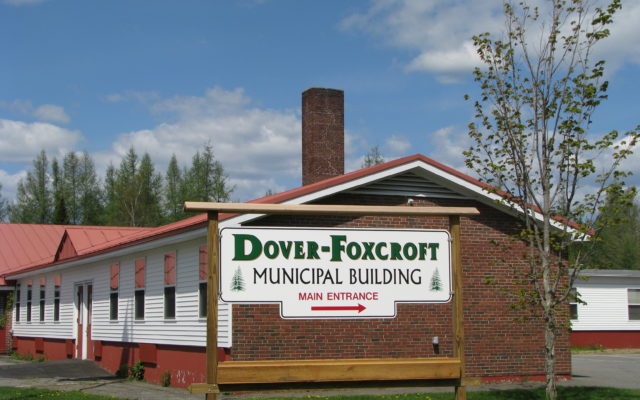
Referendum set for June 13 in Dover-Foxcroft; Warrant will include charter and retail marijuana questions
DOVER-FOXCROFT — Ten articles were approved at the 2017 annual town meeting on April 29 at the Morton Avenue Municipal Building gymnasium, with these items now moving to the Tuesday, June 13 referendum ballot to join the election of three municipal officers, one position on the RSU 68 school board as well a question concerning the 2018 RSU 68 budget (which also goes to voters in the fellow district towns of Charleston, Monson and Sebec).
The proposed 2017-18 municipal budget totals $5,074,820, a near $490,000 increase (10.68 percent) from the current fiscal year. After nearly $2,357,000 in revenues — which total a little more than $408,400 or 20.96 percent more from the year before due to higher excise tax collection and use of fund balance — have been applied a figure of $2,717,970 would need to be raised through property taxes.
The net budget total is up by approximately $81,300 from 2016-17, a difference of 3.08 percent. The proposed 2017-18 finances would lead to an approximate $0.25 increase in the mill rate, from the current rate of $20.25 for every $1,000 in assessed property.
In addition to the fiscal articles, residents will vote on revisions to the town charter recommended by the charter commission as well as a pair of articles on the prohibition of retail marijuana establishments and retail marijuana social clubs.
Chris Maas of the charter commission said there are “about five significant changes and a whole lot of insignificant changes” to the document last updated a decade ago, which is available at www.dover-foxcroft.org under “Municipal Charter” on the left side of the homepage. Maas said said most the adjustments were made to make the charter consistent with current legislation.
The proposed charter has the annual town meeting falling on the fourth Saturday of April at a time fixed by the selectmen. Voting shall be done by a show of hands unless a paper ballot is warranted by a vote of those present.
“Non-budgetary matters will be settled here at town meeting,” Maas said. “Nothing changes as far as the financial situation.”
He said the fiscal items will be moved to the polls on the second Tuesday in June, with the selectmen determining how these articles appear on the ballot as long as the total of the municipal budget appears.
Maas said many communities across New England have all municipal matters voted on at town meeting and not with a meeting and referendum. He said wanted to have just the meeting in April but the charter commission “decided to keep the secret ballot in June.”
“There’s nothing in the proposal that says we can’t list all the numbers and information that you have on this paper warrant,” Town Manager Jack Clukey said. “It’s a referendum to validate what happens in April.”
“You will have the option in April to pick and choose, that’s what you do today,” Select Chair Elwood Edgerly said.
Board member Gail D’Agostino said leading up to April there are budget advisory committee meetings and public hearings citizens can attend. “They go through every budget line item in detail,” she said.
On June 13 Dover-Foxcroft voters will have a pair of articles on the prohibition of retail marijuana establishments and retail marijuana social clubs. The first article asks if an ordinance prohibiting these operations should be enacted, and should this item fail then voters will be asked to adopt a moratorium ordinance on retail marijuana establishments and retail marijuana social clubs. Moratoriums are usually in place for about six months, and can be extended for a similar timeframe if town officials feel there is a need to do so.
“This board took this action based on the vote of the citizens of Dover-Foxcroft in November,” Select Vice Chair Cindy Freeman Cyr said. “It was pretty clear with this mandate they didn’t want recreational marijuana,” she said, as a state referendum on the legalization of the recreational use of marijuana was voted down by a count of approximately 1,100 to 800.
The proposal, which was passed via a statewide count, provides municipalities with the ability to opt out of the retail aspect of recreational marijuana. Residents can still use recreational and medicinal marijuana within the law.
Selectman Steve Grammont said having two referendum questions on the same issue is unusual. “What we were concerned about is the whole timing of it,” he said, as town officials wanted to avoid having a special town meeting on retail marijuana establishments with the matter being voted on alongside the turnout for the budget.
“We think the reading of the townspeople is they would want No. 9 but No. 10 is on there in case it is needed,” Grammont said about the numbered articles. “The feeling is we want to walk away in June with either nine or 10 in place.”
Should the ninth article pass then the ensuing moratorium article would be rendered moot. Article 10 begins with the words, “If the preceding article fails.”
Clukey said the Maine Legislature is working on a report on the implementation of retail marijuana and this information could be ready by early 2018. “If we get to a point where we as a community are missing out on opportunities for revenues in a few years we could be looking at a referendum that says ‘are you in favor of allowing certain aspects of retail marijuana?,” he said.
“Neither one is permanent, nothing can never be changed,” Grammont said.
A hearing on the warrant articles is scheduled for the selectmen’s meeting on Monday, May 22 at 6:30 p.m. at the town office.